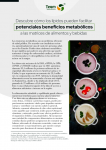Trans fat consumption during pregnancy linked to higher birth weights

The research, which examined the dietary habits of nearly 1,400 pregnant women, found that higher intake of trans fat during the second trimester of pregnancy – particularly artificial trans fats in the form of partially hydrogenated vegetable oils – was linked to higher newborn birth weights.
The authors wrote they were uncertain about the degree of harm caused by fetal exposure to trans fatty acids, but considering known health risks associated with consumption of trans fats, pregnant women should consider avoiding artificial trans fats.
“Our findings provide additional support for the effort to ban artificial TFAs [trans fatty acids] in restaurants and to reduce TFAs in the general food supply,” the authors concluded.
The study was conducted between 1999 and 2002, before industry began its efforts to reduce trans fats in the food supply, and was based on dietary questionnaires completed by participants during their first and second trimesters of pregnancy.
The relationship between higher trans fat intake and birth weights still existed even after the researchers had taken into account possible confounding factors, such as total calorie intake, education, pre-pregnancy body weight and income.
The research is the lateststudy to add to the large body of research linking artificial trans fats with adverse health effects, spurring manufacturers to find alternative ingredients. In particular, excessive consumption of trans fats is known to raise levels of low-density lipoprotein (LDL, or ‘bad’ cholesterol) and lower levels of high-density lipoprotein (HDL, or ‘good’ cholesterol), thereby clogging arteries and increasing risk of heart disease.
On the back of growing concern, the Food and Drug Administration issued a regulation which came into effect in 2006 requiring manufacturers to list trans fatty acids on the nutrition panel of foods, providing further motivation for manufacturers to slice trans fats from their products.
Source: American Journal of Clinical Nutrition
doi: 10.3945/ajcn.111.014530
“Maternal trans fatty acid intake and fetal growth”
Authors: Juliana FW Cohen, Sheryl L Rifas-Shiman, Eric B Rimm, Emily Oken, and Matthew W Gillman
















